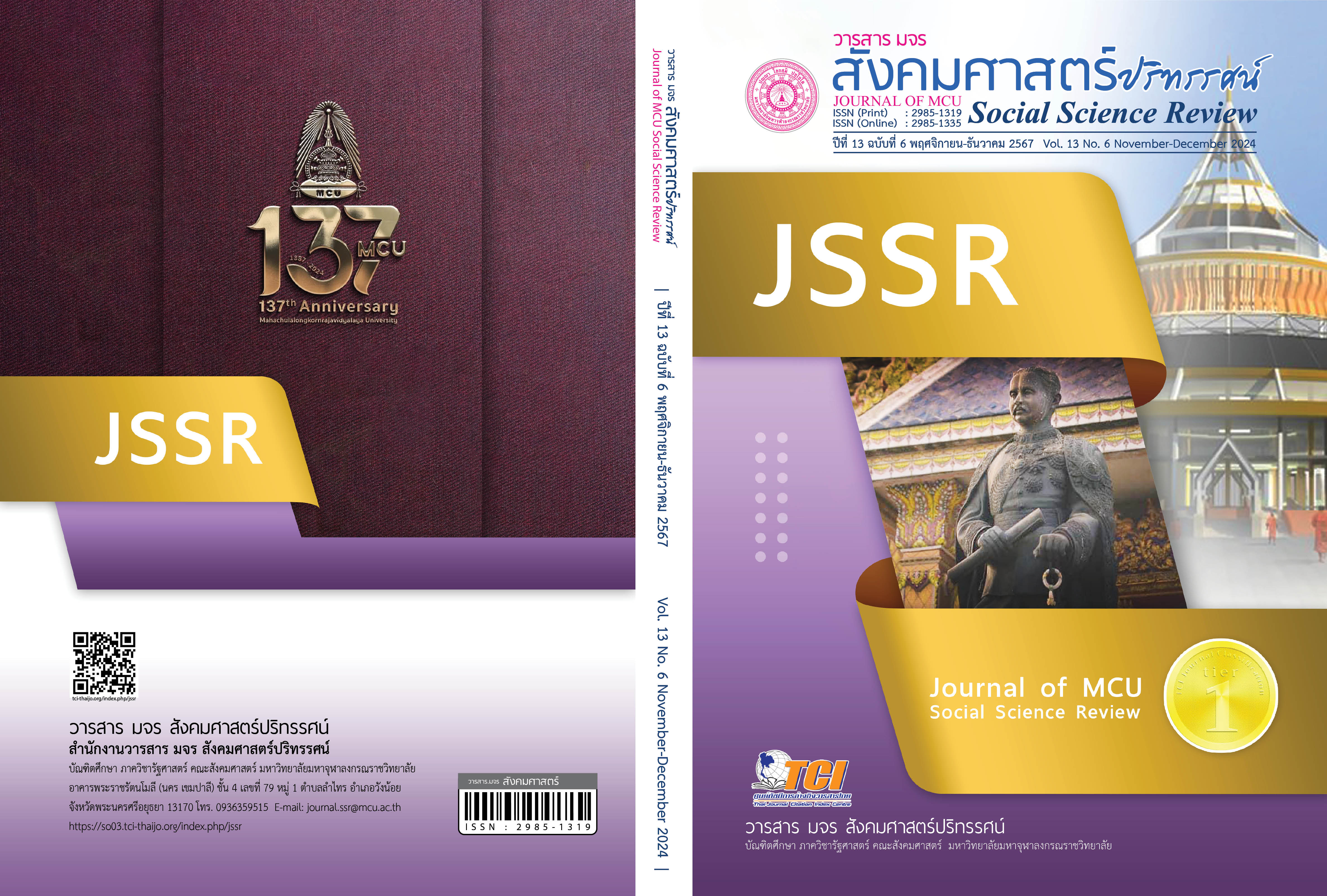การมีส่วนร่วมของคณะกรรมการชุมชนกับการพัฒนาท้องถิ่นเขตบึงกุ่ม กรุงเทพมหานคร
คำสำคัญ:
การมีส่วนร่วม, คณะกรรมการชุมชน, การพัฒนาท้องถิ่นบทคัดย่อ
บทความวิจัยนี้มีวัตถุประสงค์ 1. ศึกษาสภาพปัญหา 2. ศึกษาบทบาทการมีส่วนร่วมของคณะกรรมการชุมชน และ 3. ศึกษาการนำหลักอิทธิบาทธรรมพัฒนาบทบาทของคณะกรรมการชุมชนท้องถิ่นเขตบึงกุ่ม กรุงเทพมหานคร เป็นการวิจัยเชิงคุณภาพ เก็บข้อมูลจากผู้ให้ข้อมูลสำคัญ 4 กลุ่ม คือ นักวิชาการด้านพระพุทธศาสนา นักวิชาการด้านรัฐศาสตร์ ข้าราชการของสำนักงานเขตบึงกุ่ม และกรรมการชุมชน ด้วยการเลือกแบบเจาะจงตามลักษณะการเป็นตัวแทนกลุ่มที่เหมาะสม จำนวน 27 รูปหรือคน ใช้แบบสัมภาษณ์แบบมีโครงสร้าง มีค่าความเที่ยงตรงเชิงเนื้อหาทั้งฉบับ เท่ากับ 1.00 เป็นเครื่องมือในการเก็บข้อมูล และการสนทนากลุ่มเฉพาะโดยผู้ทรงคุณวุฒิ จำนวน 8 คน วิเคราะห์ข้อมูลจากเนื้อหาประกอบบริบท
ผลการวิจัยพบว่า 1. สภาพปัญหา การจัดการขยะยังไม่มีประสิทธิภาพ การจราจรขาดความร่วมมือกับหน่วยงานที่เกี่ยวข้องในพื้นที่ ปัญหายาเสพติดจากความหนาแน่นของประชากรและสภาพแวดล้อม ถนนซอยและทางเดินในหมู่บ้านขาดการซ่อมแซมถนนซอยที่ดินเอกชน
น้ำท่วมขังในระยะสั้น ๆ ปัญหาอากาศเสียจากหลายแหล่ง ท่อไอเสียของรถยนต์ ควันจากเรือโดยสารในคลองแสนแสบ และการก่อสร้างขาดการควบคุมเท่าที่ควร 2. การมีส่วนร่วมของคณะกรรมการชุมชน เป็นกลไกขับเคลื่อนการพัฒนาชุมชน เป็นคนกลางในการรับรายงานปัญหาจากประชาชนและประสานกับสำนักงานเขตหรือองค์กรในพื้นที่ ตั้งกลุ่มอาสาสมัครในชุมชน เพื่อร่วมมือกันติดตามการแก้ปัญหาในชุมชน 3. คณะกรรมการชุมชนกับการพัฒนาชุมชน โดยยึดหลักอิทธิบาท 4 หลักฉันทะ มีความพอใจอาสาสมัครเพื่อช่วยชุมชนแก้ปัญหา หลักวิริยะ มีความเพียรพยายามประสานและหาแนวทาง วิธีการแก้ไขปัญหาของชุมชน หลักจิตตะ เอาใจใส่ชุมชนร่วมรับฟังวางแผน จัดกิจกรรมสร้างการตระหนักรู้ในชุมชนและส่งเสริมให้ประชาชนร่วมมือกันติดตามการแก้ปัญหาในชุมชน และหลักวิมังสา พิจารณาไตร่ตรองติดตามศึกษาผลกระทบต่อชุมชนเพื่อการพัฒนาระยะยาว
เอกสารอ้างอิง
ชนดล ทรงเดชธรานันท์. (2564). แนวทางการมีส่วนร่วมของประชาชนในการบริหารจัดการขยะมูลฝอยในเขตเทศบาลอำเภอเมือง จังหวัดขอนแก่น (การค้นคว้าอิสระศิลปะศาสตรมหาบัณฑิต สาขาวิชาการบริหารจัดการองค์การ). กรุงเทพฯ: มหาวิทยาลัยเกริก.
ญาณิกา แสนธรรม และคณะ. (2563). การมีส่วนร่วมของคณะกรรมการชุมชนในการทำแผนชุมชน เขตบึงกุ่ม กรุงเทพมหานคร. วารสารมหาจุฬาคชสาร, 11(1), 57-67.
พงศ์เพชร พรหมงาม. (2566). บทบาทของคณะกรรมการชุมชนกับการพัฒนาชุมชน : กรณีศึกษาชุมชนในพื้นที่ของสำนักงานเขตคลองเตย (การศึกษาอิสระรัฐประศาสนศาสตรมหาบัณฑิต สาขาวิชารัฐประศาสนศาสตรมหาบัณฑิต). กรุงเทพฯ: มหาวิทยาลัยรามคำแหง.
พระครูใบฎีกากฤษณะ สิริคุตโต. (2558). การบริหารตามหลักอิทธิบาท 4 ของผู้บริหารเทศบาลตำบลหินตก อำเภอร่อนพิบูลย์ จังหวัดนครศรีธรรมราช (วิทยานิพนธ์รัฐศาสตรมหาบัณฑิต สาขาวิชารัฐศาสตร์การปกครอง). นครปฐม: มหาวิทยาลัยมหามกุฎราชวิทยาลัย.
พระชินกร สุจิตฺโต. (2561). การประยุกต์ใช้หลักอิทธิบาท 4 ในการปกิบัติงานของบุคลากรองค์กรปกครองส่วนท้องถิ่นอำเภอวังน้อย จังหวัดพระนครศรีอยุธยา (วิทยานิพนธ์รัฐศาสตรมหาบัณฑิต สาขาวิชารัฐศาสตร์การปกครอง). นครปฐม: มหาวิทยาลัยมหามกุฎราชวิทยาลัย.
ศศิธร พึ่งบุญ ณ อยุธยา. (2558). การมีส่วนร่วมของคณะกรรมการชุมชนต่อการขับเคลื่อนงานสวัสดิการสังคม เพื่อพัฒนาคุณภาพชีวิตประชาชน ในเขตเทศบาลเมืองแม่เหียะ อำเภอเมืองเชียงใหม่จังหวัดเชียงใหม่ (สารนิพนธ์สังคมสงเคราะห์ศาสตรมหาบัณฑิต สาขาวิชาการบริหารและนโยบายสวัสดิการสังคม). ปทุมธานี: มหาวิทยาลัยธรรมศาสตร์.
ศาลิมาร์ เกิดกลิ่ินหอม. (2563). แนวทางการมีส่วนร่วมของประชาชนในการจัดการขยะมูลฝอยในเขตเทศบาลนครนครศรีธรรมราช. วารสารการจัดการสิ่งแวดล้อม, 6(6), 61-73.
สภากรุงเทพมหานคร. (2564). คู่มือการปฏิบัติงานของสมาชิกสภากรุงเทพมหานคร. พระนครศรีอยุธยา: โรงพิมพ์มหาจุฬาลงกรณราชวิทยาลัย.
ดาวน์โหลด
เผยแพร่แล้ว
รูปแบบการอ้างอิง
ฉบับ
ประเภทบทความ
สัญญาอนุญาต
ลิขสิทธิ์ (c) 2024 วารสาร มจร สังคมศาสตร์ปริทรรศน์

อนุญาตภายใต้เงื่อนไข Creative Commons Attribution-NonCommercial-NoDerivatives 4.0 International License.
เพื่อให้เป็นไปตามกฎหมายลิขสิทธิ์ ผู้นิพนธ์ทุกท่านต้องลงลายมือชื่อในแบบฟอร์มใบมอบลิขสิทธิ์บทความให้แก่วารสารฯ พร้อมกับบทความต้นฉบับที่ได้แก้ไขครั้งสุดท้าย นอกจากนี้ ผู้นิพนธ์ทุกท่านต้องยืนยันว่าบทความต้นฉบับที่ส่งมาตีพิมพ์นั้น ได้ส่งมาตีพิมพ์เฉพาะในวารสาร มจร สังคมศาสตร์ปริทรรศน์ เพียงแห่งเดียวเท่านั้น หากมีการใช้ภาพหรือตารางหรือเนื้อหาอื่นๆ ของผู้นิพนธ์อื่นที่ปรากฏในสิ่งตีพิมพ์อื่นมาแล้ว ผู้นิพนธ์ต้องขออนุญาตเจ้าของลิขสิทธิ์ก่อน พร้อมทั้งแสดงหนังสือที่ได้รับการยินยอมต่อบรรณาธิการ ก่อนที่บทความจะได้รับการตีพิมพ์ หากไม่เป็นไปตามข้อกำหนดเบื้องต้น ทางวารสารจะถอดบทความของท่านออกโดยไม่มีข้อยกเว้นใดๆ ทั้งสิ้น





